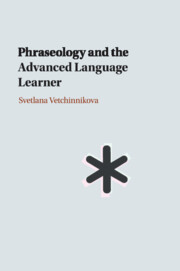Book contents
- Phraseology and the Advanced Language Learner
- Phraseology and the Advanced Language Learner
- Copyright page
- Contents
- Figures
- Tables
- Acknowledgements
- Abbreviations
- Chapter 1 Introduction
- Chapter 2 From a Unit of Meaning to a Meaning-Shift Unit
- Chapter 3 L2 Use and Processing of Multi-Word Units
- Chapter 4 Triangulating Usage, Exposure and Processing
- Chapter 5 Meaning-Shift Units in L2 Learning and Use: Usage vs. Exposure
- Chapter 6 Meaning-Shift Units in L2 Processing: Usage vs. Word Association Responses
- Chapter 7 Towards the Bigger Picture
- Book part
- References
- Index
Chapter 6 - Meaning-Shift Units in L2 Processing: Usage vs. Word Association Responses
Published online by Cambridge University Press: 18 November 2019
- Phraseology and the Advanced Language Learner
- Phraseology and the Advanced Language Learner
- Copyright page
- Contents
- Figures
- Tables
- Acknowledgements
- Abbreviations
- Chapter 1 Introduction
- Chapter 2 From a Unit of Meaning to a Meaning-Shift Unit
- Chapter 3 L2 Use and Processing of Multi-Word Units
- Chapter 4 Triangulating Usage, Exposure and Processing
- Chapter 5 Meaning-Shift Units in L2 Learning and Use: Usage vs. Exposure
- Chapter 6 Meaning-Shift Units in L2 Processing: Usage vs. Word Association Responses
- Chapter 7 Towards the Bigger Picture
- Book part
- References
- Index
Summary
Chapter 6 analyzes word association responses, categorizes them into meaning-based and syntagmatic and compares to the patterns of corresponding usage corpora. It shows that words eliciting meaning-based responses tend to be independent in usage while words eliciting syntagmatic responses tend to participate in multi-word units, suggesting that word associations can indeed say something about the processes at work in language use. A deeper analysis of syntagmatic associations and their comparison to usage patterns suggest the psycholinguistic reality of the model of a unit of meaning and in particular of abstracted associations: those of colligation and semantic preference. The chapter also discusses the core meaning effect, the influence of directionality and contiguity on the strength of association, the relationship of syntagmatic association to the boundaries of a unit of meaning as well as the evidence of the processes of fixing and approximation observed in Chapter 5.
Keywords
- Type
- Chapter
- Information
- Phraseology and the Advanced Language Learner , pp. 153 - 205Publisher: Cambridge University PressPrint publication year: 2019

